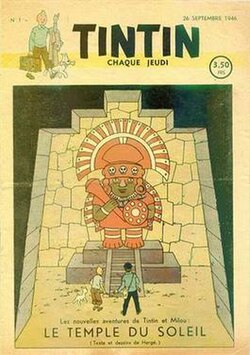Tintin (magazine)
| Tintin | |
|---|---|

Tintin No. 1 (26 Sept. 1946)
|
|
| Publication information | |
| Publisher | Le Lombard |
| Schedule | Weekly |
| Publication date | 26 Sept., 1946–1993 |
| Main character(s) | Tintin |
Tintin magazine (French: Le Journal de Tintin; Dutch: Kuifje) was a weekly Franco-Belgian comics magazine of the second half of the 20th century. Subtitled "The Magazine for the Youth from 7 to 77", it was one of the major publications of the Franco-Belgian comics scene and published such notable series such as Blake and Mortimer, Alix, and the principal title The Adventures of Tintin. Originally published by Le Lombard, the first issue was released in 1946, and it ceased publication in 1993.
Tintin magazine was part of an elaborate publishing scheme. The magazine's primary content focused on a new page or two from several forthcoming comic albums that had yet to be published as a whole, thus drawing weekly readers who could not bear to wait until later for entire albums{cite refs}. There were several ongoing stories at any given time, giving wide exposure to lesser-known artists. Tintin was also available bound as a hardcover or softcover collection. The content always included filler material, some of which was of considerable interest to fans, for example alternate versions of pages of the Tintin stories, and interviews with authors and artists. Not every comic appearing in Tintin was later put into book form, which was another incentive to subscribe to the magazine. If the quality of Tintin printing was high compared to American comic books through the 1970s, the quality of the albums was superb, utilizing expensive paper and printing processes (and having accompanyingly high prices).
Raymond Leblanc and his partners had started a small publishing house after World War II, and decided to create an illustrated youth magazine. They decided that Tintin would be the perfect hero, as he was already very well known. Business partner André Sinave went to see Tintin author Hergé, and proposed creating the magazine. Hergé, who had worked for Le Soir during the war, was being prosecuted for having allegedly collaborated with the Germans, and thus was without a publisher. After consulting with his friend Edgar Pierre Jacobs, Hergé agreed.
...
Wikipedia
